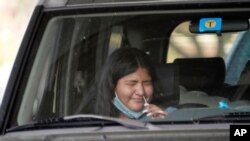As the United States comes closer to approaching 200,000 deaths from the novel coronavirus, the government’s top health agency has abruptly removed information from its website on how the virus is transmitted.
The Centers for Disease Control and Prevention published a guidance last Friday suggesting the virus can spread through small particles in the air, called aerosols, over an extended distance. But the agency suddenly removed the guidance on Monday, reverting back to its initial position that the coronavirus spreads mainly between people standing within 1.8 meters of each other, and mainly through droplets produced by talking, breathing, coughing or sneezing.
Dr. Jay Butler, the CDC’s deputy director for infectious diseases, said the update was mistakenly posted before it had gone through a proper technical review.
The method of how COVID-19 is transmitted has been under intense debate among health experts for months. In July, more than 200 scientists from over 30 countries published an open letter to the World Health Organization urging the agency to consider evidence that the virus can be spread through airborne transmission.
The CDC has also come under scrutiny for changing its guidance on who should be tested. The agency said last month that asymptomatic people did not need to be tested if they had been in close contact with an infected person, reversing its earlier advice that anyone in contact with an infected person get tested. But after it was revealed that the changes were prompted by the White House coronavirus task force, the CDC reverted to its earlier position.
The World Health Organization announced Monday that 156 nations will take part in a global initiative to develop, manufacture and equally distribute a vaccine for COVID-19.
Dr. Tedros Adhanom Ghebreyesus, the director-general of WHO, said 64 wealthy nations have agreed to take part in the COVID-19 Vaccines Global Access Facility, dubbed COVAX, a joint project undertaken by the WHO, the Coalition for Epidemic Preparedness Innovations and Gavi, The Vaccine Alliance, an organization founded by Bill and Melinda Gates to vaccinate children in the world’s poorest countries.
The initiative is aiming to deliver up to 2 billion doses of a safe and effective vaccine around the world by the end of 2021, initially targeting 3% of participating countries’ populations, namely healthcare workers and those at high-risk of the disease, with the further goal of discouraging a handful of nations from hoarding the vaccine.
Dr. Tedros said another 38 nations are expected to join COVAX in the coming days. “This is not charity, it’s in every country’s best interest,” he said. “We sink or we swim together.”
Missing from the list of participating nations are the United States, China and Russia. The U.S. previously announced it will not take part in COVAX because of WHO’s leading role in the effort. President Donald Trump withdrew the United States from the WHO in July, after saying the agency mishandled the outbreak and showed deference to China, where the virus was first detected late last year.
The Trump administration has launched its own COVID-19 vaccine initiative, Operation Warp Speed, that aims to deliver 300 million doses of an approved vaccine by next January. The initiative has distributed billions of dollars to a handful of pharmaceutical companies to develop, manufacture and test a potential vaccine.
Russia and China have also launched their own coronavirus vaccine development programs.
A day after British government health officials warned that the country is “heading in the wrong direction” due to a daily surge of new COVID-19 cases, British Prime Minister Boris Johnson is expected to announce a new set of restrictions Tuesday, including the early closure of bars and restaurants in Britain.
Britain, along with much of Europe, is experiencing a second wave of new coronavirus cases, with an average of more than 3,500 new cases a day.
British Health Secretary Matt Hancock said Sunday the country could face another round of strict restrictions if the public does not observe the new “rule of six” order issued earlier this month by Prime Minister Boris Johnson, which limits the number of people taking part in most social gatherings to six.





